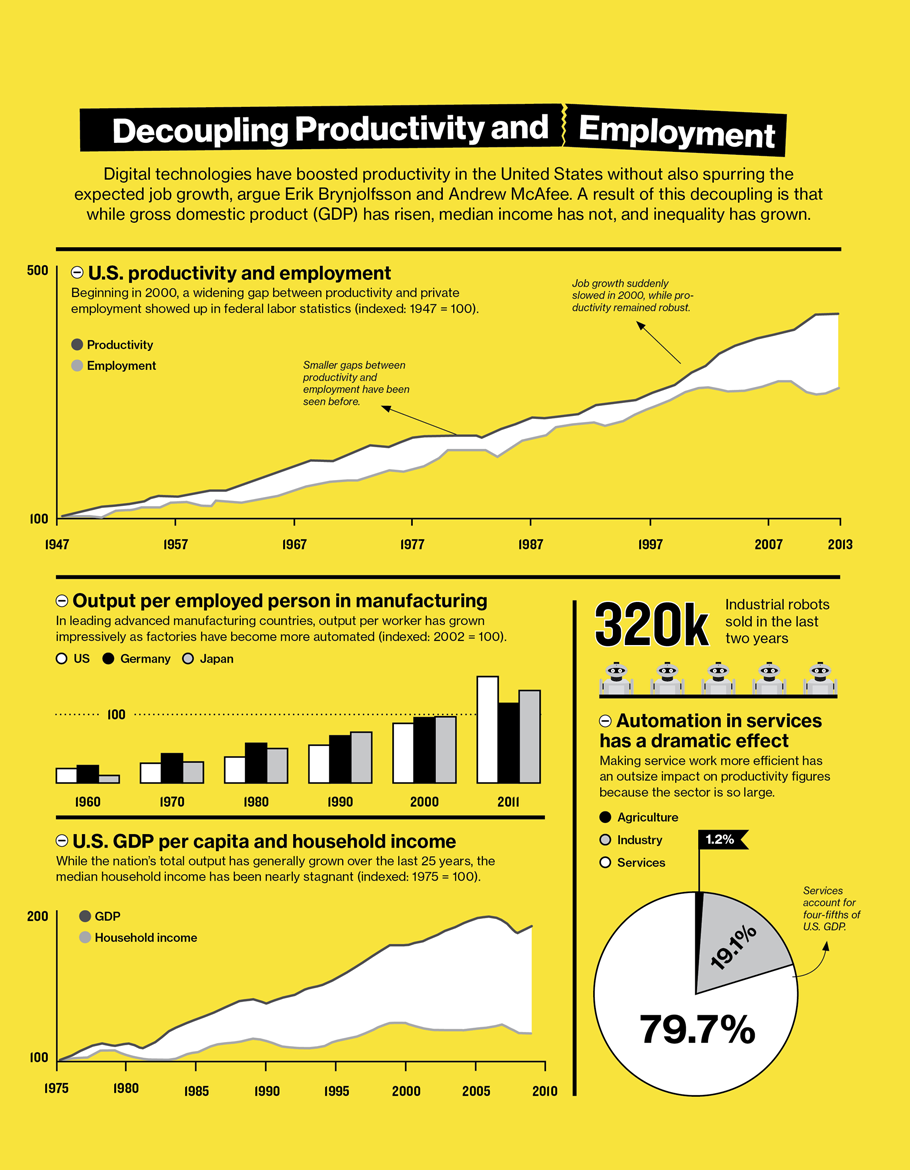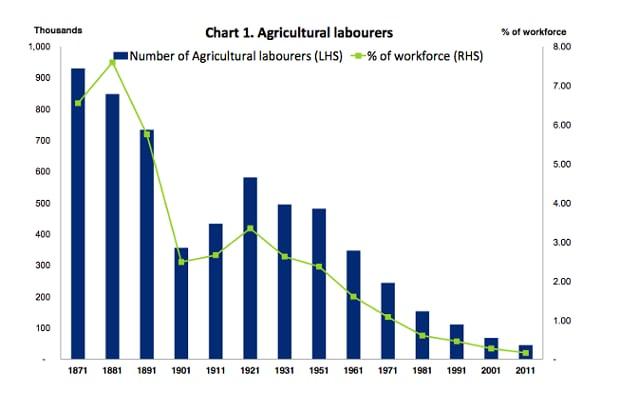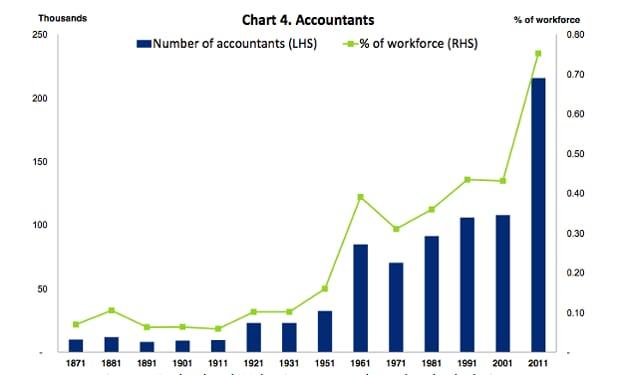Technology has been a major player in human civilization’s development throughout the ages. The rapidly evolving wheel of inventions has affected the human labor activities in many different ways. With that, came the question and the fear of whether technology is creating or destroying opportunities.
Today, more than 70% of U.S people are afraid that technology is going to take over our jobs. The distribution is higher in median classes and autonomous work forces. This is somewhat similar to how robots in iRobot were going about doing everywhere, and that’s not the only sci-fi about it either. Technology advances at an exponential rate, and it kind of dictates the flow of the market in general.
For corporate businesses, the slightest delay of adopting a new technology could result in a major loss of capital, investors or customers. Small to medium enterprises won’t stand by either, and they will not hesitate to leverage the power of technology to gain an edge. So let’s dig a little deeper into this and see how technology is actually affecting the job market.
How Technology is Destroying Jobs?
There’s no doubt that technology is destroying jobs and lots of them. Even without technologies like AGI (Artificial General Intelligence), there’s a lot of automation coming into several industries, including the services industry.
Technology enables the assembly-line paradigm to take over the job-shop paradigm in the sense that advances like A.I -at this point in time- excel at small laborious tasks and be much cheaper than a skilled workforce cost.
In Economics, productivity is the value created by a certain unit of input, such as an hour of labor, and it’s an important indicator of growth. In the U.S, productivity rates have always twined employment rates, the two were usually very close to each other.
However, in the most recent years, the two rates parted each other, as productivity kept increasing while employment not so much. We all know the reason, of course, technology.

Is technology creating more jobs than it’s destroying?
Indeed, technology is destroying jobs. But the real question is whether it’s creating more jobs than it’s destroying or not.
In fact, a recent study that was shortlisted for Rybczynski prize made by Deloitte says that technology is a great job-creating machine. It’s just like how former major tech advances didn’t render human efforts obsolete. Think about how the dwindling of horse-driven vehicles over the years caused the increase of several related jobs.
However, those business owners started to switch to other businesses that were not threatened by the new tech evolutions. One of the jobs that are threatened by tech revolutions, especially self-driving cars, is truck driving. Many drivers have expressed their concern about the how self-driving cars will drive them out of the employment sector. When their cases were further investigated, it turned out that many of them were qualified for other jobs. In fact, many stated they actually wish to work something else, but the current market standings were against their favor.

Hard laborious jobs are declining, and this is what the numbers say. But on the other end, people are switching from muscle-driven jobs to care driven or knowledge-driven jobs. In the same period when muscle jobs were declining, there was an increase of 584% in teaching industry from 1994 to 2014. Housing and care worker jobs also increased simultaneously.

But creating meaningful jobs is not the only way in which technology is creating new jobs.
New Technologies
The emergence of new technologies as business-driving solutions and not as luxurious or fantasy features is a major contributor to the creation of new jobs.
Big data, for instance, is currently creating millions of opportunities all around the world. The integration of Big data technologies is becoming a necessity for almost any type of industry, whether it’s banking or healthcare or IT.
Big data is just amassing momentum and will surely grow larger in the few coming years. This year, the market cap of Big Data is estimated to reach $48 billion, and the average salary for a big data expert is just mouthwatering as it’s higher than 98% of all other jobs.
Augmented reality is also one domain of technology that is going to boost many industries around the world. Augmedix, an innovative startup, decided to fill the gap found by the lack of mid-level workers in medical industries, and connect doctors to their scribes across the world. The real-time communication and the leveraging of Augmented reality’s features allow these scribes to perform at a higher level, and it also allows the doctor to function at his full capacity by saving him the tedious administrative work that would normally waste 3-4 hours of his day.
Even A.I is going to create a lot of opportunities, and not only in the development area. See, to reach a high level of A.I performance, the programs need to be intensely and accurately trained which will create the need for a corresponding workforce to provide the material and the appropriate training.
Borderless World
Technology is basically melting down the geographical constraints of businesses around the world. Be it learning online technical skills to running an entire business virtually, technology has come a long way. This goes with what we mentioned earlier about Augmented reality, but there’s also the freelance market. Freelancing is providing a wider cheaper pool of high-quality workers and provides flexible good paying opportunities for freelancers as well. The outsourcing market is estimated to grow and reach $5 billion this year around.
There’s a new cryptocurrency named CoinLancer that is supposed to function as a freelance platform to present a better environment for both hirers and freelancers. They aim to address the gap between the two and solve the lack of trust on the internet using the blockchain technology. CoinLancer is supposed to reach full development in October this year, although there are many doubts about it, it certainly paves the road for the idea to come to life.
Summary
It is said that a civilization’s level of advancement is often measured by how much energy it harvests per year. In that sense, it’s only natural for machinery and technology to keep advancing as a civilization grows. So we can’t remain skeptical about how technology is going to affect jobs because it’s coming either way. What we can do is better adapt ourselves to the coming changes in a technology-driven marketplace and help blue-collars find their place in there too.
Author Bio: Saurabh has worked globally for telecom and finance giants in various capacities. After working for a decade in Infosys and Sapient, he started his first startup, Lenro, to solve a hyperlocal book-sharing problem. He is interested in product, marketing, and analytics. His latest venture Hackr.io recommends the best Angular tutorial and online programming courses for every programming language. All the tutorials are submitted and voted by the programming community.














